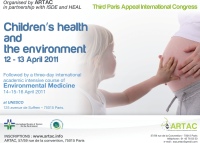- you are on : Environmental Medicine
- What environmental medicine means
What environmental medicine means
Environmental medicine is fundamentally different from environmental health both from a theoretical view and in its practice. Whereas the latter is a matter of public concern aiming at proving and interpreting links between the degradation of the environment and health (using epidemiological, toxicological & exposological, and biological methods), environmental medicine by definition deals with the diagnosis, prognostic evaluation, treatment, protective and precautionary measures and recommendations of prevention; for patients suffering from different diseases or afflictions whose environmental origin is suspected or has been already proven. Importantly this new medical approach is based first and foremost on the biological characterization of these diseases or afflictions and on their recognition and nosological classification, through the use of objective tests proving their environmental origin; and elucidating how they can be induced by environmental causes and how they can be presented and treated and according to their environmental causes.
Unlike the common medical approach, environmental medicine must therefore be based on the implementation of treatments aimed at treating the true causes of diseases or afflictions as it is the case for infections diseases, not just their symptomatic effects. Furthermore, it must provide patients with preventive measures that not only include a healthier lifestyle and the abandonment of addictions (broadly defined); but also - and this is essential – it must provide individual precautionary protection measures to face environmental factors causing the diseases and afflictions considered. Therefore, treatments are determined based not only on the bio-chemical effects observed, but mainly on upstream physio-pathological causal mechanisms underlying these effects.
Recent biological discoveries have considerably strenghtened this view point by showing that many severe chronic diseases or afflictions which constitute present public health plagues are in fact induced by environment – related epidemic mechanisms, meaning that besides a Darwinism selective interpretation of disease occurrence, we should also consider an epigenetics-associated neo-Lamarckian mechanism of disease induction. Moreover it has been recently shown that due to epidemic responses to environment changes, the first steps of many diseases may occur in utero, ie at the foetal stage. This might be particularly true in children for congenital malformations, so called rare diseases, autism, obesity, asthma; and in adults for hypo-fecondity, cancer, obesity, type 2 diabetes mellitus, allergy and some so called neurodegenerative diseases.
We should therefore consider epigenetic mechanisms upstream in the intra-organic development of diseases or afflictions, as epigenetics is a major interface between the organism and its environment. We should be aware that the global approach of environmental medicine can only be a complement to the implementation of primary prevention & precaution of the environmental causes of disease.
The concept of environmental medicine first occured in the United States, in 1962, by allergist Theron G. Randolph who perfectly described the Multiple Chemical Sensitivity Syndrome (MCS). Practice of environmental medicine was then implemented in the eighties and nineties in different European countries, by some physicians practicing general medicine. In Germany, Dr Peter Ohnsorge who created what he called the European Environmental Medicine Academy, and in France, Pr Dominique Belpomme, who created ARTAC are considered precursors.
This developing new medicine is still.often mistaken for environmental health work. It still lacks scientific foundation and standardized practices, consequently it may easily be mistaken for alternative or complementary medicines – even be taken over by their adepts.
Actually, since the Hippocrates’ “ On Airs, Waters and Places “, treaty, environmental medicine was organized on a paradigm that health is very dependent on an organism’s environment (the ‘environmental paradigm’ of medicine). Moreover, environmental medicine’s cognitive, and more particularly diagnostic and therapeutic approach uses the methods of objective observation and scientific reasoning as standard medicine does. This fundamentally distinguishes environmental medical from any ideologic or philosophical-based (non-scientific) approach.
In fact, the concept of environmental medicine itself derives from the environmental paradigm as stated in the Paris Appeal.
